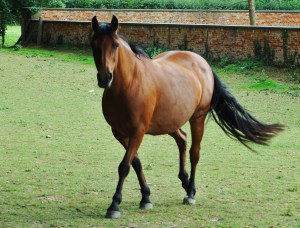The following post is by guest contributor Mary Lucille Hays. Mary teaches writing at the University of Illinois at Urbana-Champaign. She is 2015’s Jesse Stuart Fellow at Murray State University where she is pursuing her MFA. She lives in the country where she raises chickens and writes a weekly column called “Letter from Birdland” for a few community newspapers, including The Champaign Urbana News Gazette. You can find a complete list of Mary’s published works at http://publish.illinois.edu/marylucillehays/about/mary-lucille-hays-cv/. You can view her blogs at www.letterfrombirdland.blogspot.com and http://tamingjunkyarddog.blogspot.com/
The dreams were always the same. Ruth had forgotten the horses. They were there, in the pasture behind the machine shed (a pasture that didn’t exist in real life). The horses were penned in and had eaten all the hay, had drunk all the water in the rusty trough, and she had forgotten all about them for weeks. By the time she remembered to check on them they were dead or dying. Ribs protruding, they lay in the dust. Ruth would run with the hose, run with armloads of hay, but it was always too late. Sometimes there were ducks and chickens back there too, also forgotten, also starving, but always there were horses in these dreams.
Last night it almost seemed like she got there in time. She brought hay, whispered soothing words, brushed his dusty coat while he nickered in gratitude. She would save him. She would remember from here on out to feed him twice a day. Brush him. Ride him. Keep the water trough full with sweet, fresh water. She promised. But when she climbed the hayloft for another armload of hay, she found another horse, forgotten for even longer, now dead and parched. A horse mummy—just a hide stretched over bones. This horse had been writhing in the moment of death and was now frozen in that agony.
In daylight after these dreams Ruth tried to rationalize. “I must be worried about that new class,” she would tell David.
“You let yourself get all worked up,” he would say.
Or he would say, “Nature is cruel.”
But Ruth knew these dreams were not about nature, but a very human neglect. She could handle the cruelty of nature; when a hawk got one of her chickens or a weasel busted into the coop and ate the heads off of several hens, leaving their poor, matronly bodies slumped over, Ruth was philosophical. “Weasels need to eat too.”
Or the time Ruth was fixing lunch and all the birds in the neighborhood suddenly started having a riot. She had seen a robin fly up into the poplar tree with a worm that morning, so she knew there was a nest up there. Ruth wondered idly at the noise while she chopped onions and greens for a stir fry but didn’t get too excited until the liquid motion caught her eye and she saw what the trouble was. A snake was methodically devouring the contents of the nest. The nest was about 10 feet up and exactly at eye level when she looked out the kitchen window
The murder of the baby robins didn’t make Ruth sad, or angry. She actually saw it as an interesting photo op and ran to get her phone, calling for David to come help her.
Ruth got on the ladder while David stayed below, steadying it.
“I think it’s a poisonous one,” she called down. “It has a wide jaw. That’s where they keep their venom,” she told David, like she really knew what she was talking about. The snake was working on a fat baby robin. Ruth could see three other naked chicks, frantic in the nest. The robins, but also other species of birds were dive-bombing the snake, but it seemed oblivious. The head of the baby bird was in its mouth, the feet still kicking. The belly seemed too fat for the snake to swallow, but it kept on. Ruth pictured herself grabbing the snake just behind its head and pulling it out of the tree. With its mouth occupied, there was no way it could bite her. She would climb bravely down the ladder with the confused snake firmly in her grip. It would sling its tail wildly about, still trying to swallow the baby bird. Even if it could somehow let loose of its meal, Ruth would grab it too close to its jaw for it to turn around and bite her. She watched the snake for a long moment while considering this.
But instead of grabbing the snake Ruth took some photos and climbed back down. David helped her put the ladder away. She didn’t think she was scared—she just didn’t think she should mess with the balance of things. Ruth finished the stir fry while the snake finished its lunch. It wasn’t in any hurry and wove its way down the trunk of the tree when the nest was empty and took off across the yard.
No, this was the cruelty of nature. The horses were about the cruelty of neglect, and Ruth carried that image of the writhing dead horse with her for days after that dream.
The featured image is by isamiga76 found via Creative Commons.

Leave a Reply